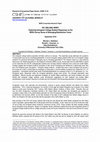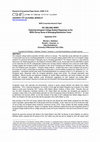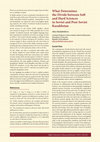Papers by Aliya Kuzhabekova

Journal of Studies in International Education, 2019
Despite the growing complexity and multidimensionality of the system of international research co... more Despite the growing complexity and multidimensionality of the system of international research collaborations, the colonial discourse casting the collaborative relationships in terms of polarized North–South antitheses persists and continues to exert influence on the nature of power distribution in the relationships, as well as on the conceptualization of some players in the relationship as superior donors, whereas others as inferior recipients. In this article, I demonstrate how dichotomic representation of the geopolitical entities involved in international research collaboration fails to acknowledge the existence and marginalizes a large and extremely talented academic community of Eurasian scholars, which has the potential to enrich and transform the global knowledge system if it becomes more actively and authoritatively involved in the international system of ideas exchange and knowledge generation. I argue that this invisibilization of post-Soviet research community is part of...
This article may be used for research, teaching, and private study purposes. Any substantial or s... more This article may be used for research, teaching, and private study purposes. Any substantial or systematic reproduction, redistribution, reselling, loan, sub-licensing, systematic supply, or distribution in any form to anyone is expressly forbidden.

The immigrant college student population will likely continue to increase. This exploratory study... more The immigrant college student population will likely continue to increase. This exploratory study addresses the questions: To what extent does sense of belonging/satisfaction of recent immigrant college students differ from non-immigrant college students? Do perceived self-ratings of belonging vary by immigrant generations? This research draws on a new extensive data source, the Student Experience in the Research University (SERU) survey. Survey data from the 2009 SERU is based on the responses from 55,433 undergraduate students from six-large research institutions from across the United States. Findings suggest that immigrant students ’ perception of their sense of belonging and satisfaction is significantly lower than their non-immigrant peers ’ perceptions. Immigrant college students-- whether they were a recent immigrant that arrived in the country as a child, or arrived later as a teenager or young adult, or are the children of parents born outside the U.S. ( 2nd generation)-- ...
The Experiences of International Faculty in Institutions of Higher Education

European Educational Research Journal, 2017
Using a qualitative interview approach, this study analyzes the experiences of women in academic ... more Using a qualitative interview approach, this study analyzes the experiences of women in academic leadership positions in post-Soviet Kazakhstan. An exploration of the extent of the relevance of Western research on female academic leadership is used to explain the experiences of female leaders in Kazakhstan. The results of the study are consistent with the results of prior studies conducted in other countries and can be largely explained by existing theories. One distinctive feature of the experiences of female leaders in Kazakhstan is the superimposition of three dominant cultures – traditional, Soviet, and Westernized neo-liberal, which impose multiple conflicting expectations. Kazakhstani women are obliged to maintain multiple identities when communicating with their colleagues, superiors and extended family members. The exact outcome of the work–life balance negotiation depends, among other factors, on the type of ownership and geographic region of a university. The study also reveals that neo-institutional theory, not conventionally used in the analysis of female leadership in academia in the West, may be particularly relevant for explaining female experiences in transitional and developing contexts; specifically, in explaining the constraints imposed by informal policy networks and corruption.

Center for Studies in Higher Education, 2010
The immigrant college student population will likely continue to increase. This exploratory study... more The immigrant college student population will likely continue to increase. This exploratory study addresses the questions: To what extent does sense of belonging/satisfaction of recent immigrant college students differ from non-immigrant college students? Do perceived self-ratings of belonging vary by immigrant generations? This research draws on a new extensive data source, the Student Experience in the Research University (SERU) survey. Survey data from the 2009 SERU is based on the responses from 55,433 undergraduate students from six-large research institutions from across the United States. Findings suggest that immigrant students’ perception of their sense of belonging and satisfaction is significantly lower than their non-immigrant peers’ perceptions. Immigrant college students -- whether they were a recent immigrant that arrived in the country as a child, or arrived later as a teenager or young adult, or are the children of parents born outside the U.S. ( 2nd generation)...

Since 1991, the government of Kazakhstan has taken many measures to transform the national resear... more Since 1991, the government of Kazakhstan has taken many measures to transform the national research and innovation system. These efforts were aimed at reorienting the system from serving the needs of the centrally planned economy to the needs of the market economy, as well as helping the system recuperate from the losses induced by the economic decline following the dissolution of the Soviet Union. There was a simultaneous and at times implicit shift from post-Soviet to Western European and American sphere of influence. While the government's science and technology policy has been framed by strategic plans, it has not necessarily been supported by a comprehensive AU: Provide affiliation AU: To indicate corrections to these proofs, please use Adobe Acrobat 10.0 or lower (a full version is required, Acrobat Reader alone will not work). Under the Tools tab, select Comment and Markup, use the STICKY NOTE feature to indicate a correction or change you require. Please DO NOT directly edit the pdf. If you do not have Adobe Acrobat, please print out the proofs, make all corrections (please make them legible), and send us a hard copy of the corrected chapters. DO NOT copy or save the files to Word and try and send us corrections, they will not be accepted.

9 These are exactly the areas of lowest output shares for Russia, according to Scopus. In-depth a... more 9 These are exactly the areas of lowest output shares for Russia, according to Scopus. In-depth analysis of such a profound contradiction is beyond the scope of this essay. We just have to mention that, while nationally-oriented academic communities in arts and humanities are typical for most non-English-speaking countries, the notion of ‘national’ medical research is clearly something worrying. Social sciences in the former USSR republics, almost non-existent in Scopus in the 1990s (possibly due to a low number of indexed journals and English language bias), have experienced a moderate rise from an average of 0.6% in 1996 to 7.8% in 2014, but this number is still lower than in the majority of Eastern European EU members. Social sciences output in those countries has also risen from an average of 3.6% to 11.6% in 2014. Baltic countries are clearly the leaders here: Lithuania (from 2.9% to 21.5%), Estonia (from 2.2% to 17.2%) and Latvia (from 1.5% to 10.4%). On the whole, our data is...

International Journal of Science Education
ABSTRACT The purpose of this study was to explore the experiences of female students enrolled in ... more ABSTRACT The purpose of this study was to explore the experiences of female students enrolled in STEM majors in highly internationalised university to understand how the various sets of cultural gender-related expectations shape their experiences. We were interested in how different cultures existing within the university and outside the university influence the girls pursuing education in STEM majors and how they deal with the conflicting discourses in this unique context. It was identified in the study that three conflicting discourses and, subsequently, various actors -faculty, potential employers, peers, and parents shape young women's experiences in STEM education and career in contradicting ways. Such a clash between different values and influences results in girls’ ambiguous understandings of their future careers as they progress in their studies. The results of the study offer some important insights into women's experiences in STEM education, which have significant implications for higher educational administrators, faculty, and policymakers in non-western and larger international contexts.
International Journal of Science Education
ABSTRACT Using the qualitative interview-based research design approach, this study analyses the ... more ABSTRACT Using the qualitative interview-based research design approach, this study analyses the experiences of female students currently enrolled in science, technology, engineering and mathematics (STEM) disciplines in the universities in Kazakhstan. More specifically, this study aimed to explore the experiences of the students in the process of transition to postsecondary education and the factors related to their decision to enrol into STEM majors. The results of the study are useful for understanding the barriers, which affect the transition of women through the STEM pipeline in non-Western traditional societies and have some important implications for research on gender issues in STEM education in the post-Soviet and larger international contexts.

Journal of Higher Education Policy and Management
ABSTRACT Building local research capacity is an enduring challenge that confronts many higher edu... more ABSTRACT Building local research capacity is an enduring challenge that confronts many higher education systems particularly when aspirations for a knowledge economy dominate policymaking. While research capacity has received tremendous attention among international development agencies and scholars, the discourse is largely oriented towards infrastructure, skills training and best practices. This study interrogates the concept of local research capacity building as a dynamic process. By contrasting the policy rhetoric with the lived experiences of academics based in Kazakhstan, we propose a conceptual model to illustrate the diverse levels of research capacity building: resources, locality, relevance, human capital and culture. This study examines research capacity building in the context of the internationalisation of higher education as researchers become increasingly mobile. We argue that investing in infrastructure and human capital are insufficient for capacity building. Rather, sustainable capacity building requires research that is relevant to the local context and a cultural environment that can nurture a vibrant research community.
ICERI2016 Proceedings, 2016
Educational Management Administration & Leadership, 2021
This study applied a bibliometric approach to a dataset of publications on women and educational ... more This study applied a bibliometric approach to a dataset of publications on women and educational leadership to critically explore the nature of research in the field and the utility of the bibliome...











Uploads
Papers by Aliya Kuzhabekova